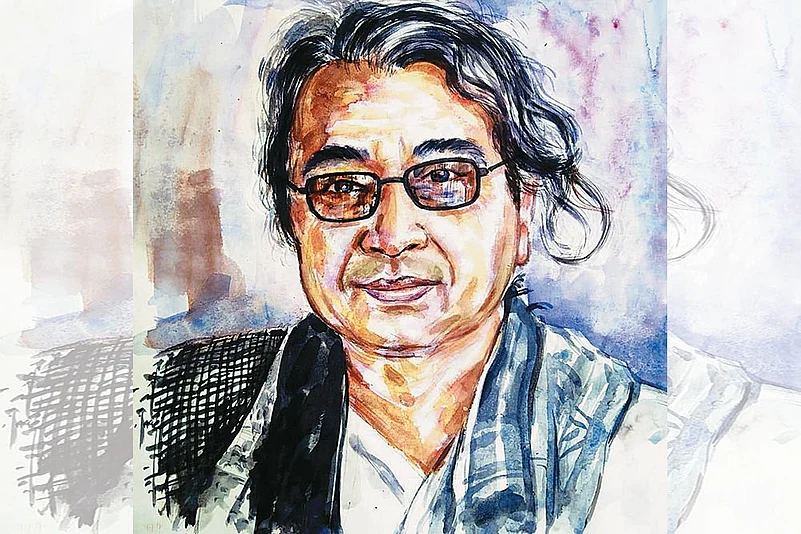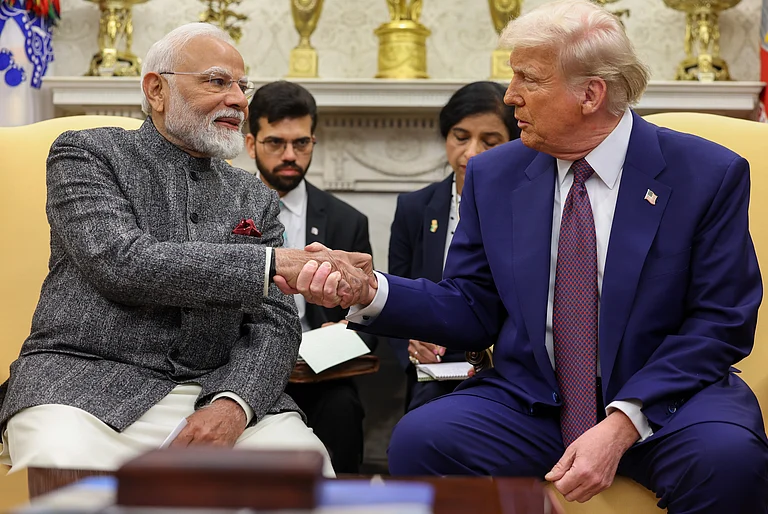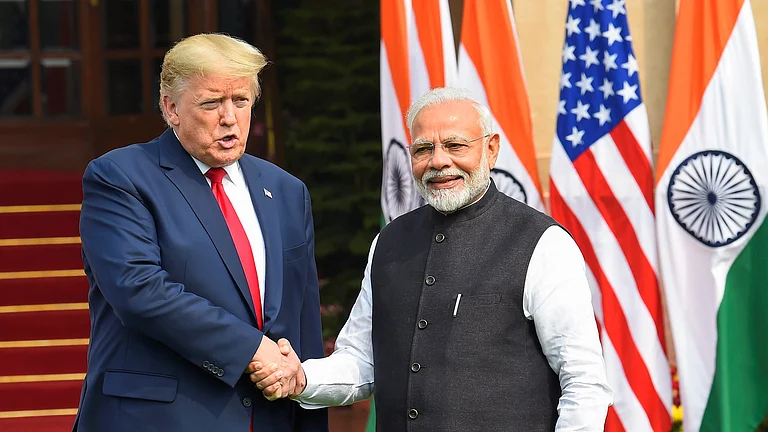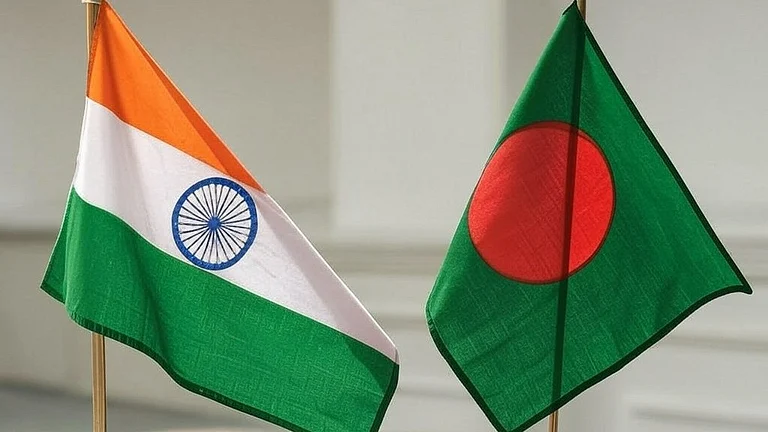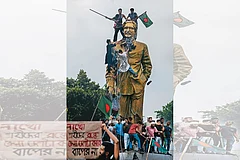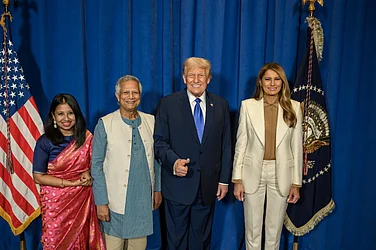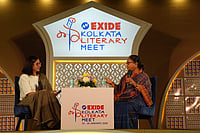How would you describe the developments of the past one and a half months?
The events of July-August represent a festival of the people against an oppressive, exploitative and tyrannical government, which repressed the will of a sovereign people with the brute force of a neo-colonial regime.
They are best described as a return to history, as Alain Badiou said for one. By history, I mean that pristine ethic of equality, human dignity and social justice that got embodied in the 1971 Liberation War of the nation. These events are a return, in the sense of the people’s reassertion of their right to liberty and human dignity, in a word, the right to freedom of truth.
The fierceness of repression, as seen in the last one month and a half before the fall of the regime, was only a concentrated expression of its one-and-a-half decade-long record of counter-insurgency warfare, denial of trade union rights and free and fair elections, forced disappearances and the enforcement of an array of draconian laws such as the Cyber Security Act, 2023.
The July-August revolution is likely to leave a historical legacy for all usurpers in the future if they want to learn: any attempt against a sovereign people’s right to liberty is bound to fail. A united people can never be vanquished.
What are your impressions of and expectations from the interim government?
An interim government is, by definition, a provisional regime instituted to facilitate the transition to a popularly elected government. I hope for the best transition possible with the limited resources, personnel and experience the interim regime would command. However, we must keep vigil against unwarranted ambitions being fostered behind baize tables and grey curtains on. Our reading of the scenario can be described in Antonio Gramsci’s well-known idioms: Optimism of the will, pessimism of the intellect.
Let us give hope a chance. As the Hispanic slogan goes: el pueblo unido jamás será vencido (the people united will never be defeated.)
In Bangladesh, political parties, as usual, failed to put together an effective opposition against tyranny for a long time. Despite their best efforts, they could not, severally or between themselves, come together to dislodge that hitherto unprecedented autocratic regime. It was a long-expected (but in the event actually unpredicted) outburst of a student vanguard that—eventually—filled the hole in leadership.
The movement began, as is now well known, as a protest against an unfair law of job reservations in the public sector but broke out into a massive uprising in the wake of the regime’s attempts at unleashing forces of repression by commanding lethal firearms on unarmed masses, forcible abductions and tortures perpetrated on all, including student leaders, and many other crimes against humanity.
The interim regime is only a stop-gap measure, albeit a logical outcome of the circumstances, in the twilight of the waning regime. Its fundamental tasks are best viewed, perhaps, as a two-tier enterprise: First, the clearing up of the debris and second, the setting up of a new house.
The first task is to restore civil rights and put an end to the remnants of the autocratic regime. This house-cleaning business involves closing those open veins of a struggling economy that shed all its blood, the restoration, the lifting of a devastatingly looted economy by its bootstraps. It is a formidable task by itself.
The second option is to transition to a democratically elected government in a free and fair way within a reasonable timetable. Both tasks involve rewriting certain aspects of the unfairly amended and mutilated constitution.
The revolution was directed not only against the regime of Sheikh Hasina, but also against the proto-colonial policies of the Indian bourgeoisie.
How do you see India’s role regarding the Bangladesh developments?
The revolution of July-August 2024 was directed not simply against the Awami League regime of Sheikh Hasina, but also against the proto-colonial policies of the Indian bourgeoisie, represented by all the regimes there since 1972. India’s monopolisation of Bangladesh’s international rivers, all 54 or more of them, is a case in point.
For years, the refusal to give a fair share of water from the river Teesta in northern Bangladesh has not been taken as a friendly gesture. The menace of a river-linking project in India sounds the death knell of Bangladesh. The degrading treatment of Bangladesh’s poorest peasantry, Muslims, Hindus, and Christians (migrant labourers)—with certain Indian leaders and agencies calling them “termites”—didn’t go unnoticed either.
More than a half-century ago, Bangladesh, in its trial of a liberation war, received invaluable help from India. But she had to pay too much in kind as a quid pro quo in its wake. Not only that. She paid a hundred-fold in half a hundred years without any gratitude whatsoever. The reduction of a sovereign neighbour to a “subsidiary ally,” i.e., to a tributary state of sorts, does not yield an idyllic view. It does not augur a friendly future after all. The Anti-Hasina revolution of 2024 has also morphed into an Anti-India pitched battle. And for prominently rational reasons.
The imperial view from New Delhi had always been a lordly one; and it is yet to change to a good neighbourly relationship of mutual respect, of a valorising give-and-take. “So close to India and so far from God,” to paraphrase that old Mexican president Porfirio Diaz’s cry of the 1910s.
How would you describe New Delhi’s reading of the current situation in Bangladesh?
New Delhi’s reading of the current situation in Bangladesh as a descent into hell for the minority Hindu population is, at best, a myopic exercise, and, at worst, an incendiary tactic. In Bangladesh, what prevails today is an anti-Indian sentiment; it should not be seen as anything like an anti-Hindu or anti-minority passion at all. The right-wing media is deliberately trying to prop up a frenzy to accompany imperial ambitions. Any adventure, civilian or military, will destroy India’s own fabric. Ergo, caveat emptor.
Bangladesh’s community solidarity is wonderful, excellent, and, in fact, exemplary in the subcontinent. Mr. Narendra Modi’s X-handle clamouring to save Hindus in Bangladesh is not only unfortunate and short-sighted but also signals an unwarranted projection of his party’s reactionary domestic agenda, the so-called Hindutva hymn, onto its neighbourhood—this not-so-little Bangladesh comprising 180 million people. It is truly unfortunate to continue dreaming of a mythic Akhand Hindustan (al la KM Munshi, or an RC Majumdar.)
Hindustan is not, after all, a country, it is a continent of sorts, of many languages, religions, and nations. It had never been an undivided whole. Only the fault lines have changed throughout recorded history. It is deplorable and disastrous that key figures in the largest state of this continent today are showing remarkable ignorance. The student movement in Bangladesh today that is spilling over (and spiralling into) a national revolution gathered its inspiration from the most recent experiences in Sri Lanka, Tunisia, Iran, and, why not, Bangladesh’s own national revolutions of 1969 and 1990.
Attempts at the ouster of an unwarranted Indian dominance and undue interference in South Asia are not unique to Dhaka. India should have learned its lessons from its adventures in Sri Lanka, in the 1980s. There is also a unison of tunes today in Colombo, Kathmandu, Thimpu and Male, not to mention Rawalpindi. Those who have ears can listen if they wish. “Krishna’s choice” is in fact not a wise option, it often kicks back than pays for.
Can you explain what you mean by Krishna’s Choice?
It is an allusion to the title of a chapter in India foreign minister S Jaishankar’s latest book, India Way, in which the author invokes the Mahabharata to defend India’s high-handed policies of intervention in the internal affairs of its smaller neighbours.
How do you view the role of the US and China?
What had been called Bangladesh’s “second liberation” has also enjoyed wider support outside the subcontinent. And that has reasons. Bangladesh’s neocolonial regimes in the recent past and their archaic economic policies included an almost hundred percent subservience to the West. That relationship is not apparently in question today. In the long run, it is not certain where the equilibrium of forces will lead the events. The problems, exacerbated by the latest tyranny, had to be met with wise and skilful policies and effective regulatory institutions.
China’s voice has been a significant force but is also remarkably mild in these troubled times. India’s degrading and irresponsible treatment of Bangladesh throughout the post-independence period has only pushed Bangladesh’s ship into China’s shores. It should not surprise anyone. It is a dangerous trajectory that the interim and future regimes in our country must tread carefully, to necessarily stay close to the People’s Republic of China, especially in the likely event of the Western world’s habitual attempts at drawing our country into the orbits of an Indian-inspired anti-Chinese coalition of Western military alliances. That will be euthanasia of our small habitat that it can hardly afford.
MORE FROM THIS ISSUE
News of wanton destruction of statues and sculptures of artistic value and historical importance (not just Sheikh Mujib's) has left many worried about religious fundamentalist efforts to undermine secularism, especially in the context of anti-idolatry movements of the past. What are your observations in this regard?
This is another example of the Indian right-wing media’s missing boat. There is no such thing as an anti-idolatry movement in Bangladesh. It is a historical trend of ancillary importance and was always there. I consider this, at best, an epi-phenomenon, the scum of the popular currents. The population of Bangladesh is a peasant lot, in any case.
Wanton destruction of historical archives and sights of national heritage are no doubt unwarranted developments. But they are contingent, collateral damage, or fringe discounts if you like to say so. Revolutions, in Mao Zhedong's world-famous parlance, are not dinner parties. They are passionate, if rational, events. Exaggerations are not uncommon when irons are hot or the hays are super dry.
History has always testified that repressed forces in attrition, once released out of the brittle bottles holding them, often become destructive in the wake of the carnival. They sober down eventually. The student movement for freedom and the united national front it put forward, to be sure, is not to be confused with so-called ‘fundamentalism’. This idiom is a product of Western anxiety with Islam, and in its wake, the Indian misgivings about Muslims. Time alone is the best antidote for these maladies.
There are, of course, myriad trends in the fringes of a mass movement that are swayed by Islamic ‘radicalism’. However, given the recent experiences of our popular culture of resistance against imperial dominance, any imposition from outside is likely to be counter-productive. The unfortunate Indo-Western anxiety attacks, especially in certain Indian quarters, are due perhaps to a lack of first-hand knowledge on their part about what's happening inside Bangladesh. The sheer ugliness is in the eyes of the beholder, in this case in those of our embedded, sectarian, jaundiced Hindutva peddlers.
Vandalism against the relics of an outdated tyranny is, in any case, not uncommon in the history of revolutions, and certainly not to be equated with philistinism tout court. There are philistines among all peoples. Did destruction of Mussolini's statues lead to the end of art in Italy? Dhaka’s last regime attempted to push the arts and literature of Bangladesh into the scaffolds of a fascist era. A sovereign people deserved better.
(This appeared in print as 'Notes From A Revolution')






